Importance of Self-Reflection and Other Awareness in Nursing Practice
VerifiedAdded on 2023/06/14
|6
|2272
|417
AI Summary
This article discusses the importance of self-reflection and other awareness in nursing practice. It highlights how self-reflection can help in improving self-awareness and knowledge about one's strengths and weaknesses. It also emphasizes the significance of effective communication, empathy, and confidence in building strong relationships with patients. The article includes an assessment using the Driscoll model to understand the importance of self-awareness in nursing practice.
Contribute Materials
Your contribution can guide someone’s learning journey. Share your
documents today.
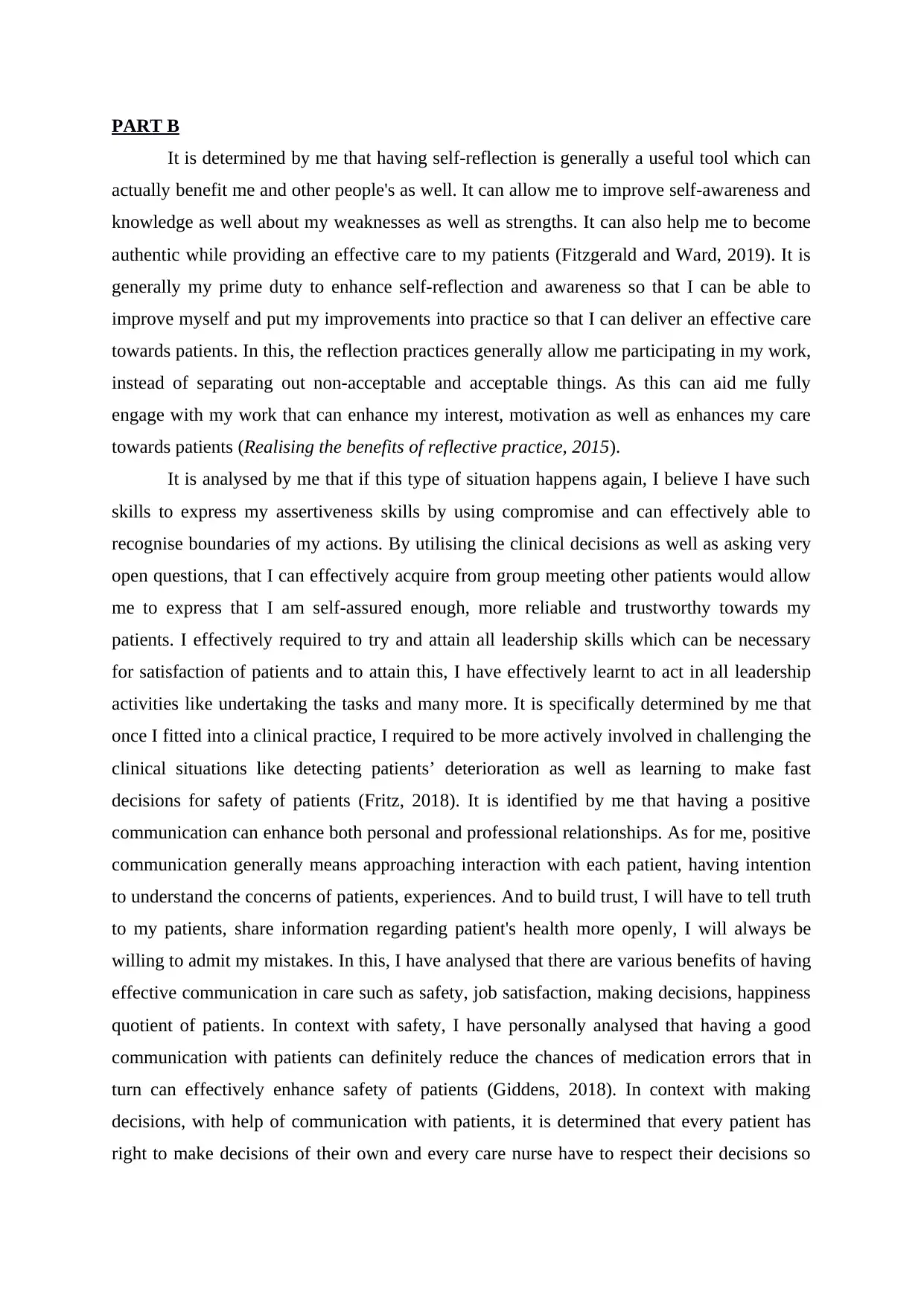
PART B
It is determined by me that having self-reflection is generally a useful tool which can
actually benefit me and other people's as well. It can allow me to improve self-awareness and
knowledge as well about my weaknesses as well as strengths. It can also help me to become
authentic while providing an effective care to my patients (Fitzgerald and Ward, 2019). It is
generally my prime duty to enhance self-reflection and awareness so that I can be able to
improve myself and put my improvements into practice so that I can deliver an effective care
towards patients. In this, the reflection practices generally allow me participating in my work,
instead of separating out non-acceptable and acceptable things. As this can aid me fully
engage with my work that can enhance my interest, motivation as well as enhances my care
towards patients (Realising the benefits of reflective practice, 2015).
It is analysed by me that if this type of situation happens again, I believe I have such
skills to express my assertiveness skills by using compromise and can effectively able to
recognise boundaries of my actions. By utilising the clinical decisions as well as asking very
open questions, that I can effectively acquire from group meeting other patients would allow
me to express that I am self-assured enough, more reliable and trustworthy towards my
patients. I effectively required to try and attain all leadership skills which can be necessary
for satisfaction of patients and to attain this, I have effectively learnt to act in all leadership
activities like undertaking the tasks and many more. It is specifically determined by me that
once I fitted into a clinical practice, I required to be more actively involved in challenging the
clinical situations like detecting patients’ deterioration as well as learning to make fast
decisions for safety of patients (Fritz, 2018). It is identified by me that having a positive
communication can enhance both personal and professional relationships. As for me, positive
communication generally means approaching interaction with each patient, having intention
to understand the concerns of patients, experiences. And to build trust, I will have to tell truth
to my patients, share information regarding patient's health more openly, I will always be
willing to admit my mistakes. In this, I have analysed that there are various benefits of having
effective communication in care such as safety, job satisfaction, making decisions, happiness
quotient of patients. In context with safety, I have personally analysed that having a good
communication with patients can definitely reduce the chances of medication errors that in
turn can effectively enhance safety of patients (Giddens, 2018). In context with making
decisions, with help of communication with patients, it is determined that every patient has
right to make decisions of their own and every care nurse have to respect their decisions so
It is determined by me that having self-reflection is generally a useful tool which can
actually benefit me and other people's as well. It can allow me to improve self-awareness and
knowledge as well about my weaknesses as well as strengths. It can also help me to become
authentic while providing an effective care to my patients (Fitzgerald and Ward, 2019). It is
generally my prime duty to enhance self-reflection and awareness so that I can be able to
improve myself and put my improvements into practice so that I can deliver an effective care
towards patients. In this, the reflection practices generally allow me participating in my work,
instead of separating out non-acceptable and acceptable things. As this can aid me fully
engage with my work that can enhance my interest, motivation as well as enhances my care
towards patients (Realising the benefits of reflective practice, 2015).
It is analysed by me that if this type of situation happens again, I believe I have such
skills to express my assertiveness skills by using compromise and can effectively able to
recognise boundaries of my actions. By utilising the clinical decisions as well as asking very
open questions, that I can effectively acquire from group meeting other patients would allow
me to express that I am self-assured enough, more reliable and trustworthy towards my
patients. I effectively required to try and attain all leadership skills which can be necessary
for satisfaction of patients and to attain this, I have effectively learnt to act in all leadership
activities like undertaking the tasks and many more. It is specifically determined by me that
once I fitted into a clinical practice, I required to be more actively involved in challenging the
clinical situations like detecting patients’ deterioration as well as learning to make fast
decisions for safety of patients (Fritz, 2018). It is identified by me that having a positive
communication can enhance both personal and professional relationships. As for me, positive
communication generally means approaching interaction with each patient, having intention
to understand the concerns of patients, experiences. And to build trust, I will have to tell truth
to my patients, share information regarding patient's health more openly, I will always be
willing to admit my mistakes. In this, I have analysed that there are various benefits of having
effective communication in care such as safety, job satisfaction, making decisions, happiness
quotient of patients. In context with safety, I have personally analysed that having a good
communication with patients can definitely reduce the chances of medication errors that in
turn can effectively enhance safety of patients (Giddens, 2018). In context with making
decisions, with help of communication with patients, it is determined that every patient has
right to make decisions of their own and every care nurse have to respect their decisions so
Secure Best Marks with AI Grader
Need help grading? Try our AI Grader for instant feedback on your assignments.
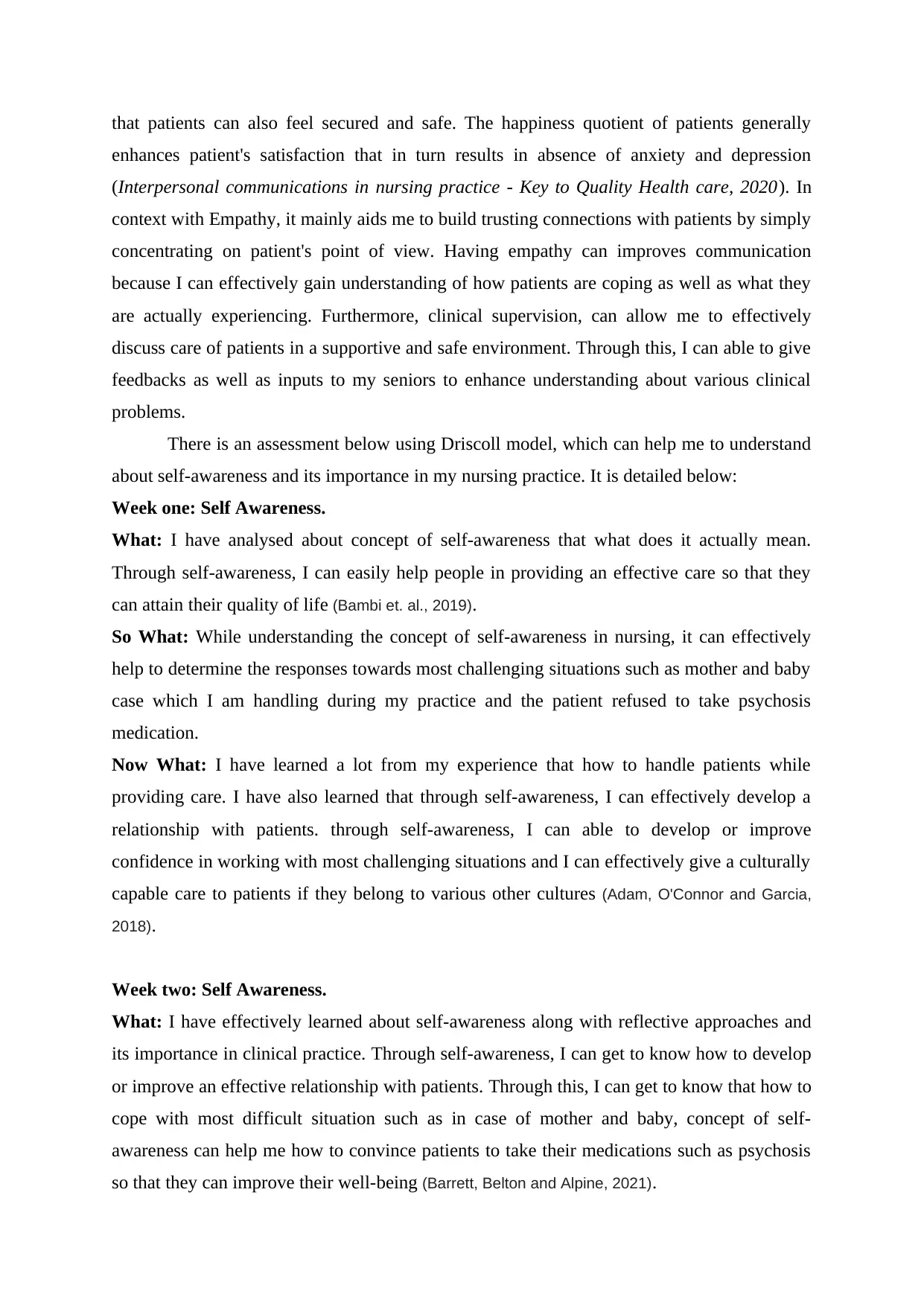
that patients can also feel secured and safe. The happiness quotient of patients generally
enhances patient's satisfaction that in turn results in absence of anxiety and depression
(Interpersonal communications in nursing practice - Key to Quality Health care, 2020). In
context with Empathy, it mainly aids me to build trusting connections with patients by simply
concentrating on patient's point of view. Having empathy can improves communication
because I can effectively gain understanding of how patients are coping as well as what they
are actually experiencing. Furthermore, clinical supervision, can allow me to effectively
discuss care of patients in a supportive and safe environment. Through this, I can able to give
feedbacks as well as inputs to my seniors to enhance understanding about various clinical
problems.
There is an assessment below using Driscoll model, which can help me to understand
about self-awareness and its importance in my nursing practice. It is detailed below:
Week one: Self Awareness.
What: I have analysed about concept of self-awareness that what does it actually mean.
Through self-awareness, I can easily help people in providing an effective care so that they
can attain their quality of life (Bambi et. al., 2019).
So What: While understanding the concept of self-awareness in nursing, it can effectively
help to determine the responses towards most challenging situations such as mother and baby
case which I am handling during my practice and the patient refused to take psychosis
medication.
Now What: I have learned a lot from my experience that how to handle patients while
providing care. I have also learned that through self-awareness, I can effectively develop a
relationship with patients. through self-awareness, I can able to develop or improve
confidence in working with most challenging situations and I can effectively give a culturally
capable care to patients if they belong to various other cultures (Adam, O'Connor and Garcia,
2018).
Week two: Self Awareness.
What: I have effectively learned about self-awareness along with reflective approaches and
its importance in clinical practice. Through self-awareness, I can get to know how to develop
or improve an effective relationship with patients. Through this, I can get to know that how to
cope with most difficult situation such as in case of mother and baby, concept of self-
awareness can help me how to convince patients to take their medications such as psychosis
so that they can improve their well-being (Barrett, Belton and Alpine, 2021).
enhances patient's satisfaction that in turn results in absence of anxiety and depression
(Interpersonal communications in nursing practice - Key to Quality Health care, 2020). In
context with Empathy, it mainly aids me to build trusting connections with patients by simply
concentrating on patient's point of view. Having empathy can improves communication
because I can effectively gain understanding of how patients are coping as well as what they
are actually experiencing. Furthermore, clinical supervision, can allow me to effectively
discuss care of patients in a supportive and safe environment. Through this, I can able to give
feedbacks as well as inputs to my seniors to enhance understanding about various clinical
problems.
There is an assessment below using Driscoll model, which can help me to understand
about self-awareness and its importance in my nursing practice. It is detailed below:
Week one: Self Awareness.
What: I have analysed about concept of self-awareness that what does it actually mean.
Through self-awareness, I can easily help people in providing an effective care so that they
can attain their quality of life (Bambi et. al., 2019).
So What: While understanding the concept of self-awareness in nursing, it can effectively
help to determine the responses towards most challenging situations such as mother and baby
case which I am handling during my practice and the patient refused to take psychosis
medication.
Now What: I have learned a lot from my experience that how to handle patients while
providing care. I have also learned that through self-awareness, I can effectively develop a
relationship with patients. through self-awareness, I can able to develop or improve
confidence in working with most challenging situations and I can effectively give a culturally
capable care to patients if they belong to various other cultures (Adam, O'Connor and Garcia,
2018).
Week two: Self Awareness.
What: I have effectively learned about self-awareness along with reflective approaches and
its importance in clinical practice. Through self-awareness, I can get to know how to develop
or improve an effective relationship with patients. Through this, I can get to know that how to
cope with most difficult situation such as in case of mother and baby, concept of self-
awareness can help me how to convince patients to take their medications such as psychosis
so that they can improve their well-being (Barrett, Belton and Alpine, 2021).
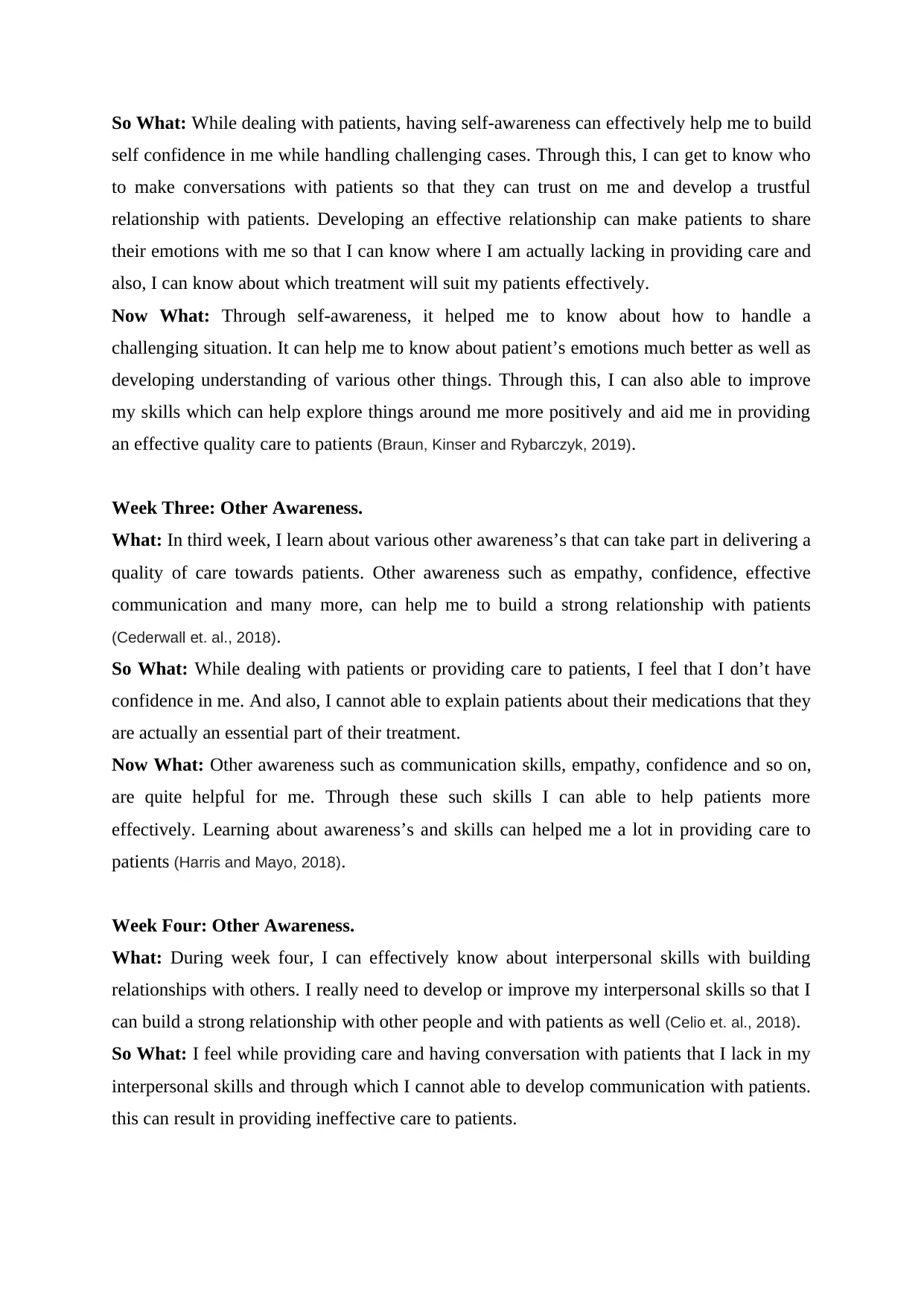
So What: While dealing with patients, having self-awareness can effectively help me to build
self confidence in me while handling challenging cases. Through this, I can get to know who
to make conversations with patients so that they can trust on me and develop a trustful
relationship with patients. Developing an effective relationship can make patients to share
their emotions with me so that I can know where I am actually lacking in providing care and
also, I can know about which treatment will suit my patients effectively.
Now What: Through self-awareness, it helped me to know about how to handle a
challenging situation. It can help me to know about patient’s emotions much better as well as
developing understanding of various other things. Through this, I can also able to improve
my skills which can help explore things around me more positively and aid me in providing
an effective quality care to patients (Braun, Kinser and Rybarczyk, 2019).
Week Three: Other Awareness.
What: In third week, I learn about various other awareness’s that can take part in delivering a
quality of care towards patients. Other awareness such as empathy, confidence, effective
communication and many more, can help me to build a strong relationship with patients
(Cederwall et. al., 2018).
So What: While dealing with patients or providing care to patients, I feel that I don’t have
confidence in me. And also, I cannot able to explain patients about their medications that they
are actually an essential part of their treatment.
Now What: Other awareness such as communication skills, empathy, confidence and so on,
are quite helpful for me. Through these such skills I can able to help patients more
effectively. Learning about awareness’s and skills can helped me a lot in providing care to
patients (Harris and Mayo, 2018).
Week Four: Other Awareness.
What: During week four, I can effectively know about interpersonal skills with building
relationships with others. I really need to develop or improve my interpersonal skills so that I
can build a strong relationship with other people and with patients as well (Celio et. al., 2018).
So What: I feel while providing care and having conversation with patients that I lack in my
interpersonal skills and through which I cannot able to develop communication with patients.
this can result in providing ineffective care to patients.
self confidence in me while handling challenging cases. Through this, I can get to know who
to make conversations with patients so that they can trust on me and develop a trustful
relationship with patients. Developing an effective relationship can make patients to share
their emotions with me so that I can know where I am actually lacking in providing care and
also, I can know about which treatment will suit my patients effectively.
Now What: Through self-awareness, it helped me to know about how to handle a
challenging situation. It can help me to know about patient’s emotions much better as well as
developing understanding of various other things. Through this, I can also able to improve
my skills which can help explore things around me more positively and aid me in providing
an effective quality care to patients (Braun, Kinser and Rybarczyk, 2019).
Week Three: Other Awareness.
What: In third week, I learn about various other awareness’s that can take part in delivering a
quality of care towards patients. Other awareness such as empathy, confidence, effective
communication and many more, can help me to build a strong relationship with patients
(Cederwall et. al., 2018).
So What: While dealing with patients or providing care to patients, I feel that I don’t have
confidence in me. And also, I cannot able to explain patients about their medications that they
are actually an essential part of their treatment.
Now What: Other awareness such as communication skills, empathy, confidence and so on,
are quite helpful for me. Through these such skills I can able to help patients more
effectively. Learning about awareness’s and skills can helped me a lot in providing care to
patients (Harris and Mayo, 2018).
Week Four: Other Awareness.
What: During week four, I can effectively know about interpersonal skills with building
relationships with others. I really need to develop or improve my interpersonal skills so that I
can build a strong relationship with other people and with patients as well (Celio et. al., 2018).
So What: I feel while providing care and having conversation with patients that I lack in my
interpersonal skills and through which I cannot able to develop communication with patients.
this can result in providing ineffective care to patients.
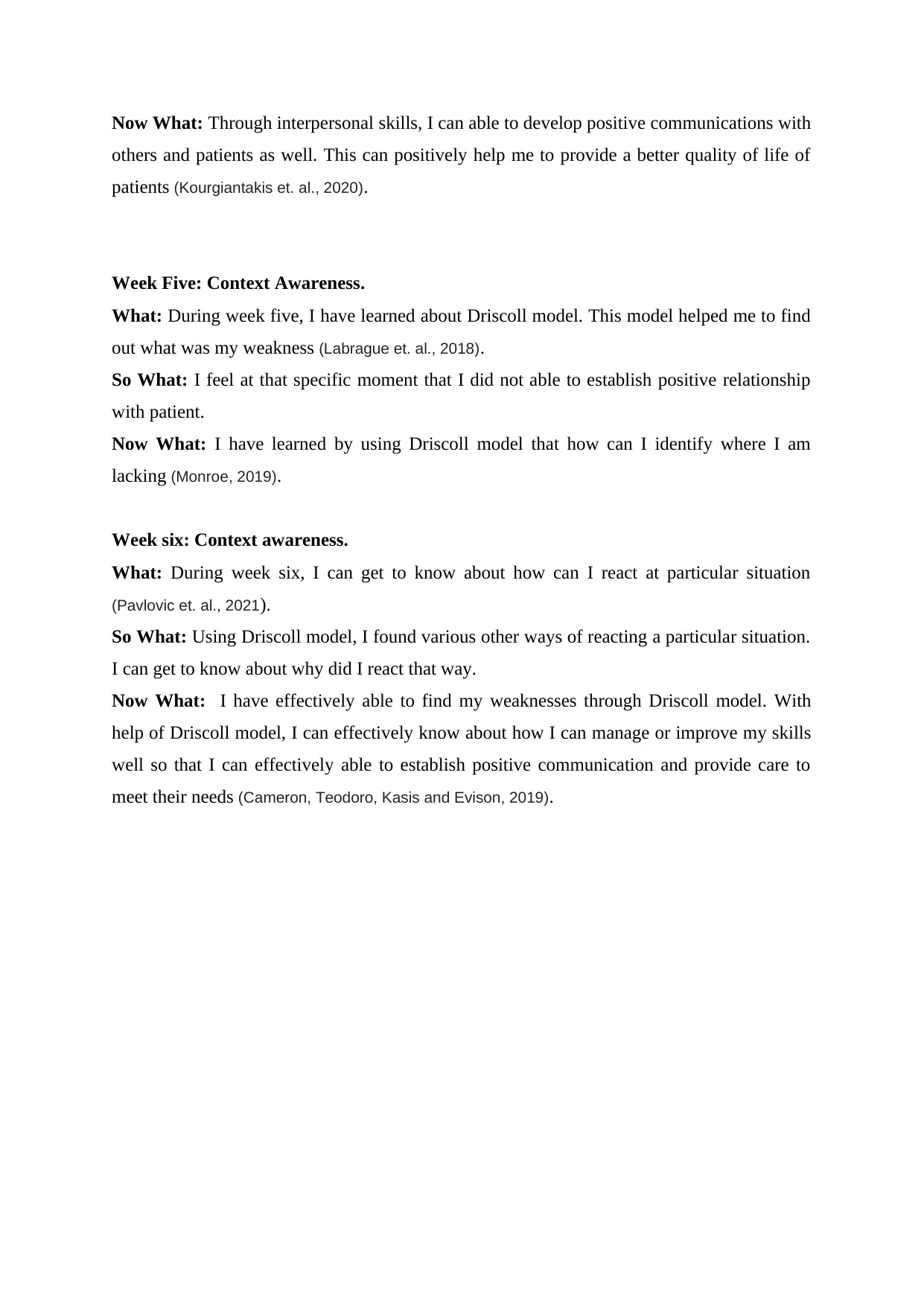
Now What: Through interpersonal skills, I can able to develop positive communications with
others and patients as well. This can positively help me to provide a better quality of life of
patients (Kourgiantakis et. al., 2020).
Week Five: Context Awareness.
What: During week five, I have learned about Driscoll model. This model helped me to find
out what was my weakness (Labrague et. al., 2018).
So What: I feel at that specific moment that I did not able to establish positive relationship
with patient.
Now What: I have learned by using Driscoll model that how can I identify where I am
lacking (Monroe, 2019).
Week six: Context awareness.
What: During week six, I can get to know about how can I react at particular situation
(Pavlovic et. al., 2021).
So What: Using Driscoll model, I found various other ways of reacting a particular situation.
I can get to know about why did I react that way.
Now What: I have effectively able to find my weaknesses through Driscoll model. With
help of Driscoll model, I can effectively know about how I can manage or improve my skills
well so that I can effectively able to establish positive communication and provide care to
meet their needs (Cameron, Teodoro, Kasis and Evison, 2019).
others and patients as well. This can positively help me to provide a better quality of life of
patients (Kourgiantakis et. al., 2020).
Week Five: Context Awareness.
What: During week five, I have learned about Driscoll model. This model helped me to find
out what was my weakness (Labrague et. al., 2018).
So What: I feel at that specific moment that I did not able to establish positive relationship
with patient.
Now What: I have learned by using Driscoll model that how can I identify where I am
lacking (Monroe, 2019).
Week six: Context awareness.
What: During week six, I can get to know about how can I react at particular situation
(Pavlovic et. al., 2021).
So What: Using Driscoll model, I found various other ways of reacting a particular situation.
I can get to know about why did I react that way.
Now What: I have effectively able to find my weaknesses through Driscoll model. With
help of Driscoll model, I can effectively know about how I can manage or improve my skills
well so that I can effectively able to establish positive communication and provide care to
meet their needs (Cameron, Teodoro, Kasis and Evison, 2019).
Secure Best Marks with AI Grader
Need help grading? Try our AI Grader for instant feedback on your assignments.
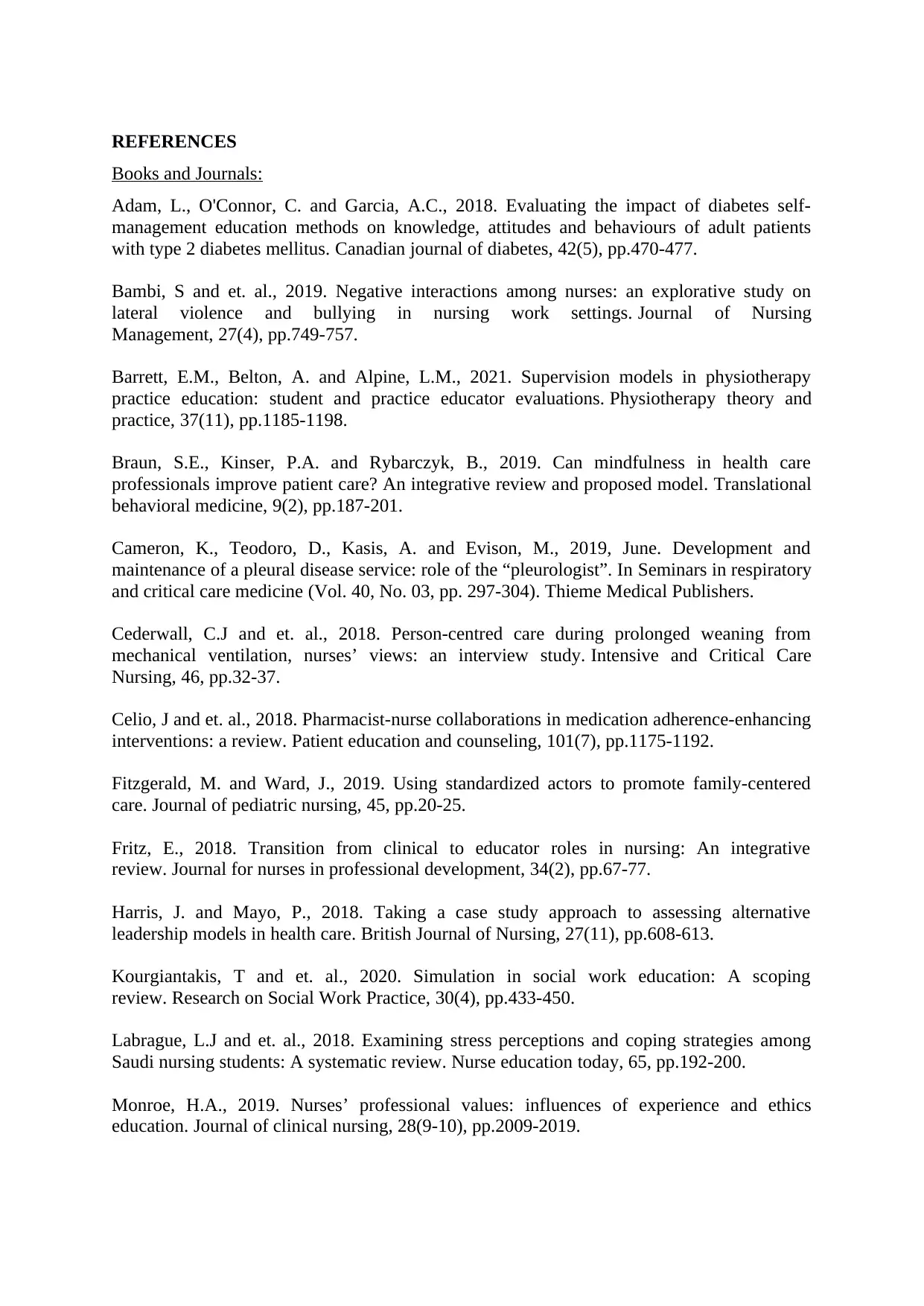
REFERENCES
Books and Journals:
Adam, L., O'Connor, C. and Garcia, A.C., 2018. Evaluating the impact of diabetes self-
management education methods on knowledge, attitudes and behaviours of adult patients
with type 2 diabetes mellitus. Canadian journal of diabetes, 42(5), pp.470-477.
Bambi, S and et. al., 2019. Negative interactions among nurses: an explorative study on
lateral violence and bullying in nursing work settings. Journal of Nursing
Management, 27(4), pp.749-757.
Barrett, E.M., Belton, A. and Alpine, L.M., 2021. Supervision models in physiotherapy
practice education: student and practice educator evaluations. Physiotherapy theory and
practice, 37(11), pp.1185-1198.
Braun, S.E., Kinser, P.A. and Rybarczyk, B., 2019. Can mindfulness in health care
professionals improve patient care? An integrative review and proposed model. Translational
behavioral medicine, 9(2), pp.187-201.
Cameron, K., Teodoro, D., Kasis, A. and Evison, M., 2019, June. Development and
maintenance of a pleural disease service: role of the “pleurologist”. In Seminars in respiratory
and critical care medicine (Vol. 40, No. 03, pp. 297-304). Thieme Medical Publishers.
Cederwall, C.J and et. al., 2018. Person-centred care during prolonged weaning from
mechanical ventilation, nurses’ views: an interview study. Intensive and Critical Care
Nursing, 46, pp.32-37.
Celio, J and et. al., 2018. Pharmacist-nurse collaborations in medication adherence-enhancing
interventions: a review. Patient education and counseling, 101(7), pp.1175-1192.
Fitzgerald, M. and Ward, J., 2019. Using standardized actors to promote family-centered
care. Journal of pediatric nursing, 45, pp.20-25.
Fritz, E., 2018. Transition from clinical to educator roles in nursing: An integrative
review. Journal for nurses in professional development, 34(2), pp.67-77.
Harris, J. and Mayo, P., 2018. Taking a case study approach to assessing alternative
leadership models in health care. British Journal of Nursing, 27(11), pp.608-613.
Kourgiantakis, T and et. al., 2020. Simulation in social work education: A scoping
review. Research on Social Work Practice, 30(4), pp.433-450.
Labrague, L.J and et. al., 2018. Examining stress perceptions and coping strategies among
Saudi nursing students: A systematic review. Nurse education today, 65, pp.192-200.
Monroe, H.A., 2019. Nurses’ professional values: influences of experience and ethics
education. Journal of clinical nursing, 28(9-10), pp.2009-2019.
Books and Journals:
Adam, L., O'Connor, C. and Garcia, A.C., 2018. Evaluating the impact of diabetes self-
management education methods on knowledge, attitudes and behaviours of adult patients
with type 2 diabetes mellitus. Canadian journal of diabetes, 42(5), pp.470-477.
Bambi, S and et. al., 2019. Negative interactions among nurses: an explorative study on
lateral violence and bullying in nursing work settings. Journal of Nursing
Management, 27(4), pp.749-757.
Barrett, E.M., Belton, A. and Alpine, L.M., 2021. Supervision models in physiotherapy
practice education: student and practice educator evaluations. Physiotherapy theory and
practice, 37(11), pp.1185-1198.
Braun, S.E., Kinser, P.A. and Rybarczyk, B., 2019. Can mindfulness in health care
professionals improve patient care? An integrative review and proposed model. Translational
behavioral medicine, 9(2), pp.187-201.
Cameron, K., Teodoro, D., Kasis, A. and Evison, M., 2019, June. Development and
maintenance of a pleural disease service: role of the “pleurologist”. In Seminars in respiratory
and critical care medicine (Vol. 40, No. 03, pp. 297-304). Thieme Medical Publishers.
Cederwall, C.J and et. al., 2018. Person-centred care during prolonged weaning from
mechanical ventilation, nurses’ views: an interview study. Intensive and Critical Care
Nursing, 46, pp.32-37.
Celio, J and et. al., 2018. Pharmacist-nurse collaborations in medication adherence-enhancing
interventions: a review. Patient education and counseling, 101(7), pp.1175-1192.
Fitzgerald, M. and Ward, J., 2019. Using standardized actors to promote family-centered
care. Journal of pediatric nursing, 45, pp.20-25.
Fritz, E., 2018. Transition from clinical to educator roles in nursing: An integrative
review. Journal for nurses in professional development, 34(2), pp.67-77.
Harris, J. and Mayo, P., 2018. Taking a case study approach to assessing alternative
leadership models in health care. British Journal of Nursing, 27(11), pp.608-613.
Kourgiantakis, T and et. al., 2020. Simulation in social work education: A scoping
review. Research on Social Work Practice, 30(4), pp.433-450.
Labrague, L.J and et. al., 2018. Examining stress perceptions and coping strategies among
Saudi nursing students: A systematic review. Nurse education today, 65, pp.192-200.
Monroe, H.A., 2019. Nurses’ professional values: influences of experience and ethics
education. Journal of clinical nursing, 28(9-10), pp.2009-2019.
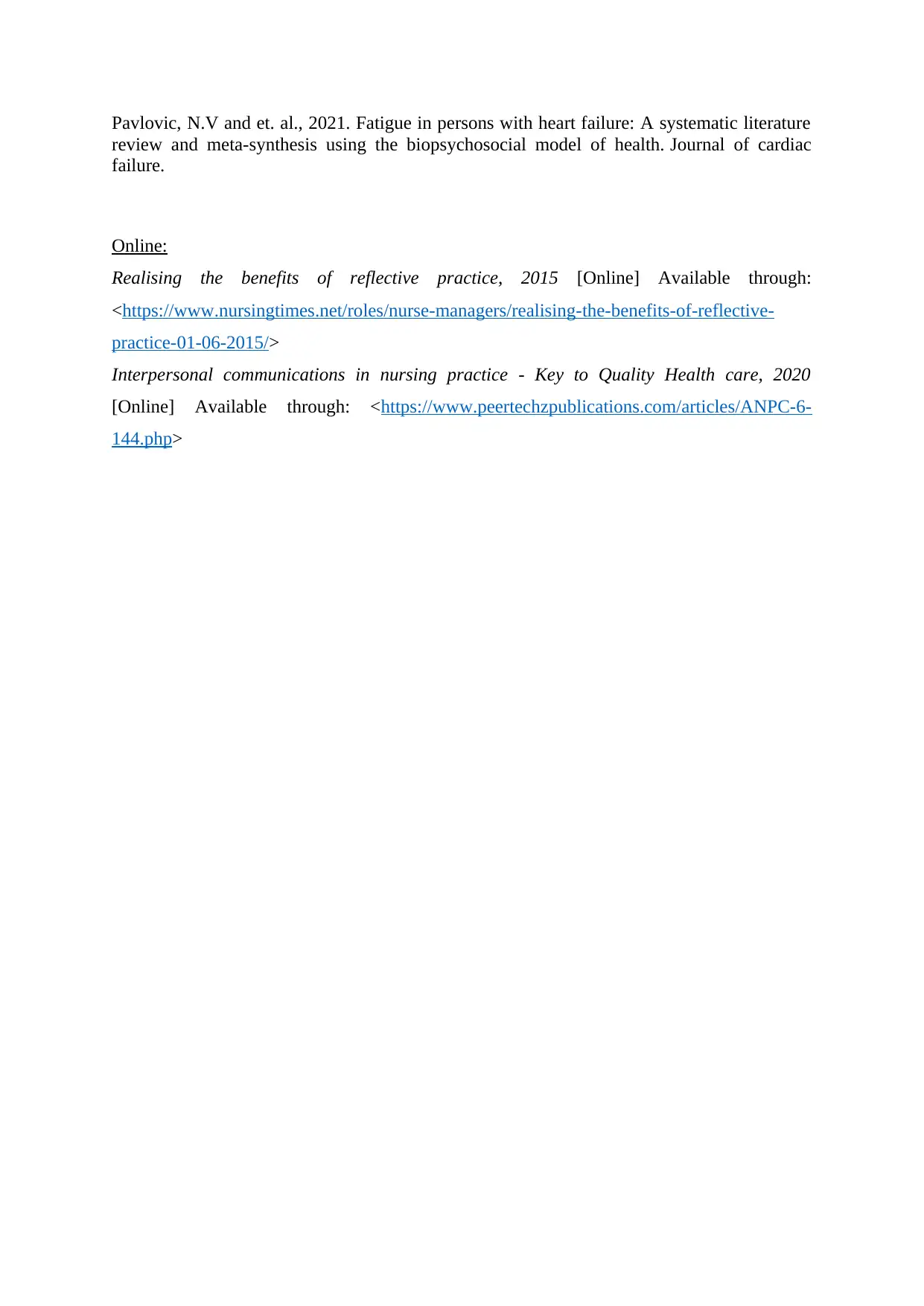
Pavlovic, N.V and et. al., 2021. Fatigue in persons with heart failure: A systematic literature
review and meta-synthesis using the biopsychosocial model of health. Journal of cardiac
failure.
Online:
Realising the benefits of reflective practice, 2015 [Online] Available through:
<https://www.nursingtimes.net/roles/nurse-managers/realising-the-benefits-of-reflective-
practice-01-06-2015/>
Interpersonal communications in nursing practice - Key to Quality Health care, 2020
[Online] Available through: <https://www.peertechzpublications.com/articles/ANPC-6-
144.php>
review and meta-synthesis using the biopsychosocial model of health. Journal of cardiac
failure.
Online:
Realising the benefits of reflective practice, 2015 [Online] Available through:
<https://www.nursingtimes.net/roles/nurse-managers/realising-the-benefits-of-reflective-
practice-01-06-2015/>
Interpersonal communications in nursing practice - Key to Quality Health care, 2020
[Online] Available through: <https://www.peertechzpublications.com/articles/ANPC-6-
144.php>
1 out of 6
Related Documents
Your All-in-One AI-Powered Toolkit for Academic Success.
+13062052269
info@desklib.com
Available 24*7 on WhatsApp / Email
![[object Object]](/_next/static/media/star-bottom.7253800d.svg)
Unlock your academic potential
© 2024 | Zucol Services PVT LTD | All rights reserved.




